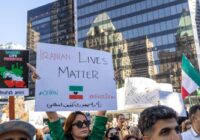According to Jared Kushner, once the Palestinians agree to conform to US practices, the patch of the world they will be allowed to live in will be their oyster.
As the world continues to hang on every word spoken by Middle East problem-solver Jared Kushner in the hope of understanding the future of the entire region as it will play out according to his still unveiled “deal of the century,” his latest comments reveal important evidence of what he and the Trump administration are preparing.
Kushner, who is US President Donald Trump’s son-in-law, believes in self-determination for the Palestinians, but sees several prerequisites before they can be trusted to govern themselves: “The Palestinians, he said, ‘need to have a fair judicial system … freedom of press, freedom of expression, tolerance for all religions’ before the Palestinian areas can become ‘investable.’”
Here is today’s 3D definition:
Investable:
Applied to people and nations, existing or worthy of being recognized as existing because the prospect of making a profit from the fact of their existence will earn the confidence of the financial sector
Contextual note
According to Kushner, self-determination involves creating an “area” where people with money from the West can use their cash in opportunities that are “investable” for their own profit. He is expecting the Palestinians to provide the area — their living space that has been granted to them by Israel —in which foreigners, once the plan is implemented, will not only be the owner and most likely the managers of the assets, but will also be in a position to impose the behavioral rules for the people who inhabit the area. In classical economic terms, these people should be called “the consumers,” though in another sense they might even be the equivalent of slave labor.
What emerges from the hints Kushner is willing to release is the message everyone has been expecting: that the Middle East peace plan is built on the idea that Palestinians will accept second-class citizenship in a prosperous economy provided paternalistically by Israel and the US, complemented by the riches and benevolent oversight of Saudi Arabia and the United Arab Emirates.
Unconcerned by the fact that the Palestinians have said — on the basis of the rare hints that have been given — that they would oppose the plan, Kushner frames the question of their motivation to accept or reject it much in the same way as a Madison Avenue marketing executive might. “Do they think this will allow them to have a pathway to a better life or not?” is what he answers to journalist Jonathan Swan’s question about whether it would be reasonable for Palestinians to trust a team composed of orthodox Jews telling them how they may live their lives after the US government has betrayed their wishes and legal rights on every key issue — from funding Israeli settlements in Palestinian territory to moving the US Embassy to Jerusalem and cutting off all aid.
Historical and cultural notes
Kushner, who is senior adviser to the president, perfectly exemplifies the gap between US culture and practically every other culture in the world. This is not a dramatic “clash of civilizations,” but more simply a deep and messy cultural misunderstanding due to the arrogance of a nation that is economically and militarily dominant and incapable of calling into question its inclination to suppose that its own values are a model the rest of the world wishes to emulate.
American capitalism sees entrepreneurial initiative as the sole solution to all problems. Kushner has no idea why Palestinians might cling to cultural values transmitted by the history of their people when an enterprising consultant from the richest nation in the world can show them how to improve their bottom line.
Swan raises the vital question of trust, an essential value shared by many cultures, particularly in the Middle East, which Kushner dismisses as irrelevant. Negotiation, for him, is not about people but about monetary interest. Kushner states, “I do believe they want to have a better life,” apparently meaning access to the kinds of consumer goods Americans and Israelis live for and work for.
When pressed about his personal relations with Saudi Crown Prince Mohammed bin Salman, specifically with reference to the murder of journalist Jamal Khashoggi, Kushner reveals another feature of his culture: the necessary secrecy in political decision-making. He says: “One thing about the way I’ve conducted myself is not a lot of people know who I’ve been talking to and what I’ve been talking about and that protects people.” This attitude would appear to contradict the supposed openness and frankness of US culture. It belongs to both mafia culture (omertà or the law of silence), and the political culture of despotic, monarchic or military regimes, such as Saudi Arabia and Egypt.
One of the true contributions of the Trump administration to the understanding of contemporary US history is to reveal the serious contradiction (some might say, hypocrisy) that existed well before Trump as an essential feature of a regime that proclaims itself to be the model of transparent democracy, but has progressively perfected the means of “protecting” anyone and everyone complicit in the kinds of “understandings” and dealings that allow specific groups of people to exercise inordinate degrees of power over the rest of the population, behind closed doors. Thanks to Hollywood and television, we know what the mafia offers (and demands) when it promises a local shopkeeper “protection.”
Kushner reveals that his secret talks with public criminals are there because “that protects people.” It also protects their investments.
*[In the age of Oscar Wilde and Mark Twain, another American wit, the journalist Ambrose Bierce, produced a series of satirical definitions of commonly used terms, throwing light on their hidden meanings in real discourse. Bierce eventually collected and published them as a book, The Devil’s Dictionary, in 1911. We have shamelessly appropriated his title in the interest of continuing his wholesome pedagogical effort to enlighten generations of readers of the news.]
The views expressed in this article are the author’s own and do not necessarily reflect Fair Observer’s editorial policy.
Support Fair Observer
We rely on your support for our independence, diversity and quality.
For more than 10 years, Fair Observer has been free, fair and independent. No billionaire owns us, no advertisers control us. We are a reader-supported nonprofit. Unlike many other publications, we keep our content free for readers regardless of where they live or whether they can afford to pay. We have no paywalls and no ads.
In the post-truth era of fake news, echo chambers and filter bubbles, we publish a plurality of perspectives from around the world. Anyone can publish with us, but everyone goes through a rigorous editorial process. So, you get fact-checked, well-reasoned content instead of noise.
We publish 3,000+ voices from 90+ countries. We also conduct education and training programs
on subjects ranging from digital media and journalism to writing and critical thinking. This
doesn’t come cheap. Servers, editors, trainers and web developers cost
money.
Please consider supporting us on a regular basis as a recurring donor or a
sustaining member.
Will you support FO’s journalism?
We rely on your support for our independence, diversity and quality.








Commenting Guidelines
Please read our commenting guidelines before commenting.
1. Be Respectful: Please be polite to the author. Avoid hostility. The whole point of Fair Observer is openness to different perspectives from perspectives from around the world.
2. Comment Thoughtfully: Please be relevant and constructive. We do not allow personal attacks, disinformation or trolling. We will remove hate speech or incitement.
3. Contribute Usefully: Add something of value — a point of view, an argument, a personal experience or a relevant link if you are citing statistics and key facts.
Please agree to the guidelines before proceeding.